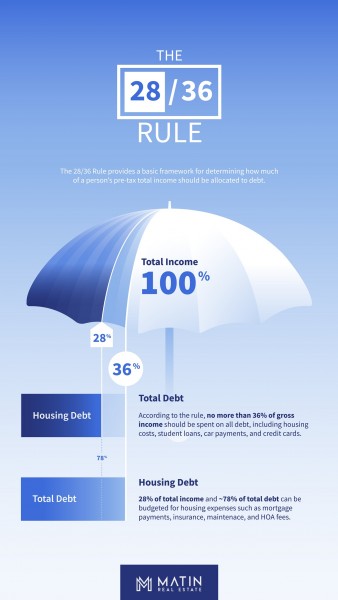Are you in the market for a home? If so, you may have heard of the 28/36 Rule. While the numbers are used primarily by lenders, they can also help homebuyers; understanding the 28/36 Rule is one of the best ways to know how much to spend on a home. Here’s everything you need to know about the rule, from how it works to if there are exceptions.
How Does the 28/36 Rule Work?
The 28/36 rule is a guideline often used by lenders when determining if a borrower can afford a particular loan. The rule states that a borrower's monthly housing expenses should not exceed 28% of their gross monthly income, and their total debt payments should not exceed 36% of their monthly income.

Image courtesy of PortlandRealEstate.com
So, for example, pretend your monthly income is $5,000. Your monthly housing expenses will include things like taxes and HOA fees. To get your front-end ratio, you'll divide those expenses by your monthly income. So if you'd be spending $1,250 on housing expenses, your ratio will be 25%.
Similarly, you get your back-end ratio by dividing your monthly debt payments (mortgage, credit card, student loans, etc.) by your income. If your debt payments are $1,750, your ratio is 35%. So since both numbers fall under the rule's guidelines, you have a better chance of getting the loan.
While the 28/36 rule is not a hard-and-fast rule, it is a good general guideline for borrowers to follow. By staying within these limits, homebuyers know they should be able to afford the home.
Why Does the 28/36 Rule Matter?
For lenders, the 28/36 rule provides a way to assess a borrower's ability to pay back a loan. If a borrower's housing expenses take up too much of their income, there is a greater risk that the borrower will default on their loan.
For buyers, the 28/36 rule is an excellent way to stay within their budget and avoid taking on too much debt. By keeping their housing expenses and debts below the guidelines, they can ensure that they can comfortably make their mortgage payments each month.
The 28/36 rule is just one tool that can be used to help you make smart financial decisions. When buying a home or taking out a loan, work with a lender you trust and ask them what they recommend for your unique situation.
Are There Exceptions to the 28/36 Rule?
If a borrower has a good credit score or a large down payment, they may be able to qualify for a loan that has slightly higher monthly payments. Another thing to remember is that different loans have different desired ratios. Some might allow for higher debt-to-income ratios, while others may not ask for a front-end ratio at all.
However, it's important to remember that this rule is designed to help ensure that borrowers can comfortably afford their mortgage payments. As such, borrowers should consider their financial situation carefully before taking on any additional debt.
What If You Can't Follow the 28/36 Rule?
If your housing costs or your debt levels are too high, there are still things you can do to improve your financial situation. One option is to try to increase your income. If you bring in more money each month, you'll be better positioned to meet your financial obligations. Another option is to focus on reducing your expenses. If you can reduce non-essential spending, you'll free up more money for your debts.
Finally, you may also want to consider refinancing your debts to get a lower interest rate and lower monthly payments, or paying some off entirely if they're small enough. By taking these steps, you can improve your front- and back-end ratios and get your finances back on track. As always, it's important to speak with a financial expert before taking any drastic steps.
Buy a Home Within Your Budget
Homeownership is a great investment that can provide stability and security. The 28/36 Rule can help you achieve this goal. It's an important guideline to follow when buying a home, as it can ensure you stay within your budget and avoid financial stress in the future. There are some exceptions to the rule, but for the most part, it is a good guide to follow. It's not always easy, but with some careful planning and realistic expectations, you can make the rule work for you.











Author
Homesgofast com
Homesgofast.com is an international real estate portal and news source for Google news. Publishing international real estate, finance, homes and travel-related news and blogs for a targeted audience since 2002. Each news item is circulated to thousands of potential readers each day and is also available to the millions of people who sign up for Google news alerts. Find homes offered for sale and to rent direct from owners and some of the best real estate agents from over 35 countries